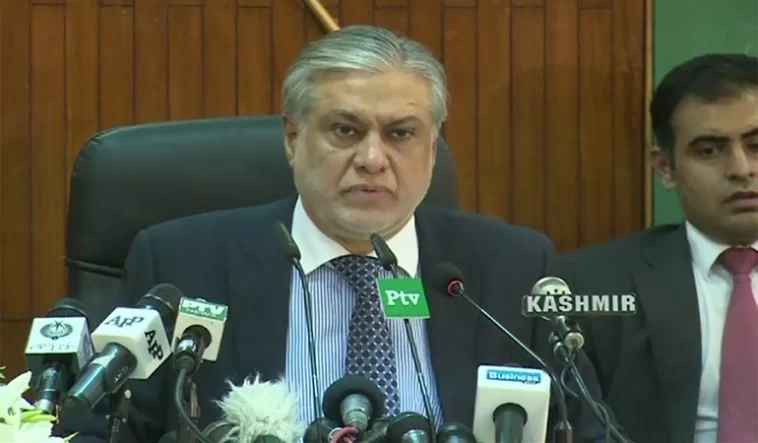On Wednesday, Finance Minister Ishaq Dar claimed Saudi Arabia and China would boost Pakistan’s foreign exchange reserves before the end of this month and that the government would soon impose a flood levy on the wealthy and a hefty gain tax on banks’ foreign exchange earnings to raise income.
He said the International Monetary Fund (IMF) programme would be completed at all costs, China and Saudi Arabia would increase their support, government-to-government (G2G) disinvestments would be completed, and the current account deficit would be $3 billion less than projected.
“Our foreign exchange reserves by end-June would be much better than you can think,” Mr. Dar said at a joint news conference with five other PML-N ministers.
The press conference was a response to the opposition party Pakistan Tehreek-i-Insaf PTI’s white paper” a day earlier, which warned of unrest due to hyperinflation and unemployment.
The minister denied that a threshold committed with the IMF during the eighth quarterly review for contingency budgetary measures had been passed, as revenue collection over the first five months (July to November) of this fiscal year was above target.
He added that a Rs270-290bn super tax projected for December could not deliver results due to stay orders, leading in a revenue shortfall in December.
He said, We are in any case planning to beef up revenues and considering a flood levy and a substantial recovery on account of unprecedented foreign exchange windfalls earned by the banking sector, but no measure would add to the burden on common people already suffering a lot.
He stated that petrol and diesel prices had reduced by Rs19-20 per liter and kerosene and light diesel by Rs29-30 for three months.
The finance minister replied that many countries taxed foreign exchange earnings.
He claimed several agencies were fighting currency and other contraband.
The minister recalled that China and Saudi Arabia had promised to expand their help for Pakistan during the prime minister’s September visits. The Saudi finance minister later verified this to international news media.
He said the process was delayed, but Saudi Arabia would increase its support before the end of the month while the Chinese loan rollover was processed. He said privatisation transactions, including G2G sales of LNG plants and others, were progressing and would be completed within six months.
The minister said the IMF delay was due to the PTI government’s “reckless decisions” before the no-confidence vote.
The Fund asked about the quarter ending December instead of the original end-October performance and the 11th and 12th reviews (through June), notably how Pakistan would finance $16.3bn flood-related requirements.
Mr. Dar said, “We have provided these things” and would meet the IMF at a donors’ conference in Geneva on Jan. 9.
Inflation “major concern”
He acknowledged that the administration was concerned about inflation and would now work to lower it. He predicted lower inflation and economic indices by June 30, 2023.
Planning Minister Ahsan Iqbal blamed massive devaluation, PTI’s energy price cut package, and the global inflationary cycle for higher commodity prices.
Mr. Dar said the PTI leaders did not present what they inherited except the current account deficit, which was shown out of context and the PTI failed to improve on that count by the conclusion of its tenure.
He said the legacy the new government inherited from the previous administration strongly influenced the economy since April 2022.
According to the IMF managing director, one-third of the world will be in recession in 2023, including Pakistan.
Mr. Dar also disputed the PTI’s claim that it created 5.5 million jobs between 2019 and 2022. Official data from the party put the number at 3.2 million.
He said the PML-N had increased revenue collection from Rs1.938 trillion to Rs3.844tr in the last year, while the PTI administration reduced it to Rs3.829tr in its first year and reached Rs6.1tr in five years despite promising to double it from Rs3.9tr in 2018 to 8tr in its first year.
He said revenue collection rose 17.5pc to Rs3.429tr in the first six months of the 2022-23 financial year, meeting the annual target of Rs7.5tr.


